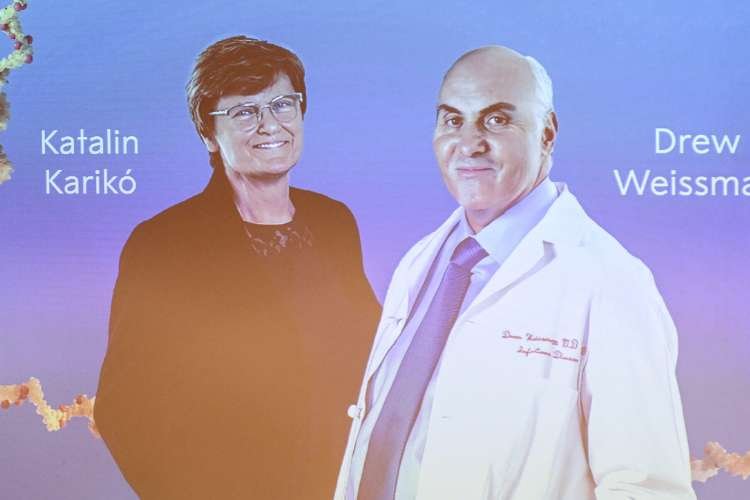Two visionary scientists, Dr. Katalin Karikó and Dr. Drew Weissman, have been honored with the prestigious Nobel Prize for their revolutionary contributions that paved the way for the development of mRNA vaccines against COVID-19. This groundbreaking achievement has not only changed the trajectory of the global pandemic but has also ushered in a new era of vaccine technology.
In collaboration with fellow researchers, Dr. Karikó and Dr. Weissman embarked on their pioneering journey in 2005 when they published a seminal paper on nucleoside base modifications. Their work shed light on a crucial aspect of mRNA vaccines – dendritic cells recognizing transcribed mRNA as foreign material, triggering cellular activation and signaling molecule release. This pivotal observation ignited their quest to understand why mRNA was perceived as an invader.
Also Read: CanSino Biologics Eyes More MRNA Vaccine Deals After AstraZeneca Pact
The addition of base modifications to the mRNA proved to be a game-changer, nearly eradicating the inflammatory response. This breakthrough discovery unveiled the intricate mechanisms by which cells identify and respond to nucleic acids, setting the stage for a revolutionary leap in vaccine development. Subsequent research revealed that modified mRNA significantly enhances protein production compared to its unmodified counterpart.
Recognizing the immense therapeutic potential of this technology, visionary scientists and investors swiftly took notice. In 2008, BioNTech was established, followed by Moderna two years later. By 2012, BioNTech was already conducting clinical trials using non-nucleoside modified RNA. This era witnessed an influx of funding into the sector, with leading players attracting venture capital investment and forging monumental partnerships with pharmaceutical giants.
Throughout the 2010s, research and development in the field progressed steadily, though optimism was occasionally tempered by setbacks, such as the phase 2b failure of CureVac’s prostate cancer vaccine candidate. However, it was in the year 2020 that progress in mRNA vaccine technology reached supersonic speeds. The COVID-19 pandemic provided the perfect proving ground, demonstrating unequivocally that mRNA-based vaccines were not only faster but also more effective than traditional approaches.
Gunilla Karlsson Hedestam, Ph.D., a professor at the Karolinska Institutet and a member of the Royal Swedish Academy of Sciences’ COVID-19 expert group, emphasized the profound impact of Karikó and Weissman’s discoveries on the pandemic during a Nobel Prize winner announcement press conference.
Also Read: Pfizer And BioNTech Challenge Moderna’s MRNA Vaccine Patents In A Bid To End Monopoly
“What’s important here, I think, is that vaccines could be developed so fast. And this was … largely due to improvements in the technology, and this basic discovery that allowed this. So, I think in terms of saving lives, especially in the early phase of the pandemic, it was very important.”
– Gunilla Karlsson Hedestam, Ph.D
The Nobel Prize awarded to Dr. Karikó and Dr. Weissman reflects the remarkable speed at which mRNA technology evolved from a highly promising but unproven concept to a vaccination modality deployed across entire populations. At the press conference, Dr. Thomas Perlmann, a Karolinska professor, shared Dr. Karikó’s journey, highlighting her transformation from job loss a decade ago to becoming a Nobel laureate today. This inspiring story underscores the immense impact their work has had on global health and the future of vaccine technology.





























